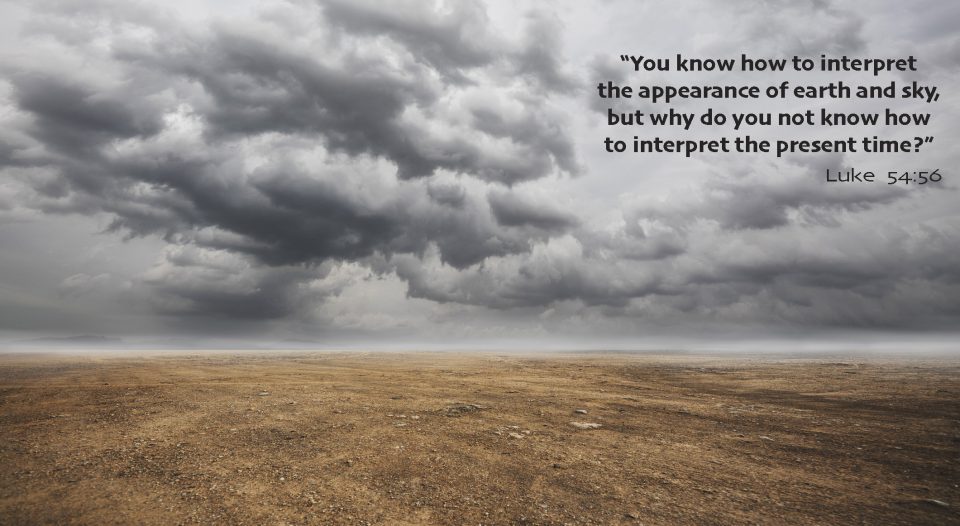Lectionary for Aug. 17, 2025
10th Sunday after Pentecost
Jeremiah 23:23-29; Psalm 82;
Hebrews 11:29–12:2; Luke 12:49-56
A photo has been circulating of white male lawmakers kneeling in prayer on the floor of the U.S. House of Representatives before voting on a bill to remove food aid from the poor, Medicaid and hospital access from the rural poor and seniors, and safety and dignity from migrants. Rarely does one image so succinctly represent the lectionary passages. Our presiding bishop has already addressed this legislation, but I would like to use it to think about the words of Scripture this week.
In the Gospel reading, Jesus critiques the people of his day for knowing how to analyze the weather but not knowing how to analyze the times (Luke 12:56). If you lived in Judea, you’d know that clouds from the Mediterranean mean rain and winds from the desert mean heat. The people knew this. But illegitimate puppet rulers, unjust persecution of people and ideas, and political murders should have been equally clear signs that big changes are coming from Jesus’ hearers. The rich getting richer and the increasing oppression of the poor means that God will intervene soon to overturn everything. That is the theme of the introductory prayers in Luke from Mary, Zechariah and Simeon, and it is carried through this passage.
Jesus’ message is that the kingdom of God is coming. The kingdom will demand a reorientation of allegiance from Herod, from Rome, from violent zealotry and from any other way that is counter to the upside-down kingdom. This was and is a divisive message, and Jesus knows it. He offers a just kingdom where the widow, orphan, poor and foreigners have special position. The powerful and wealthy are certainly welcome if they are willing to give away all they have.
In Jesus’ day, as in our own, families fracture based on visions of God’s mission. Is God’s dream for the world militarized borders, wealth concentration and ethnostates? Or is God’s goal positive justice, where the first are last and the last are first? (Hint: Luke 13:30.)
Jesus knew how to analyze the times and to tell the truth about good and evil, no matter who it offended.
Let’s be honest. It’s seductive and comforting to have our own way and come out on top. We all have dreams of what we want the world to look like, right? The prophet Jeremiah took aim at those who would substitute their own dreams and visions for what God wants.
In Jeremiah’s day, leaders and prophets went around proclaiming that God wanted this or that, with a suspicious alignment of what was good for those in power and what (they said) God wanted (Jeremiah 23:36). But God won’t abide people substituting their will for the divine. God’s word is a fire that consumes injustice and idolatry (29). In other words, to quote theologian Reinhold Niebuhr, the goal of God’s word—and the preacher’s job in preaching it—is to “comfort the afflicted and afflict the comfortable.”
Jeremiah insisted that God is close at hand, not secluded in some distant heaven and unconcerned with the daily lives of God’s people. There is no place where the wicked can scheme to deprive their neighbors of justice and love without God noticing (23-24). Jeremiah, and the prophets generally, were called to analyze the times they lived in. Isaiah, Jeremiah, Amos, Malachi and the rest were commanded to pronounce deeply unpopular assessments of leaders who were evil and faithless shepherds, who led those entrusted to them to ruin and punishment.
To be clear, doing the right thing—acting faithfully—isn’t always popular. In Hebrews 11, we learn that some by faith conquered kingdoms while others by faith were sawn in half. Some administered justice while others were tortured. Some quenched the fury of the flames, and others were stoned to death (33-37). Standing up for the “least of these” is probably not going to be popular or even safe. Jesus’ ministry of good news to the poor (Luke 4:18) was seen as heresy by the Sadducees and riotous by the Romans—and eventually got him murdered. But Jesus knew how to analyze the times and to tell the truth about good and evil, no matter who it offended.
During the back-and-forth struggle over Christianity in the Roman Empire in the centuries after Jesus’ resurrection, Julian “the Apostate” sought to de-Christianize Rome. His uncle, Constantine the Great, had officially tolerated Christianity decades earlier. But when Julian was unsuccessful in stamping out the “way of the Galileans,” he remarked in a letter to a pagan priest: “For it is disgraceful that, when no Jew ever has to beg, and the impious Galileans [Christians] support not only their own poor but ours as well, all men see our people lack aid from us.” Even Julian knew how to analyze the times. Any institution that cuts off aid and support to its own people is doing the opposite of the work of Jesus.






